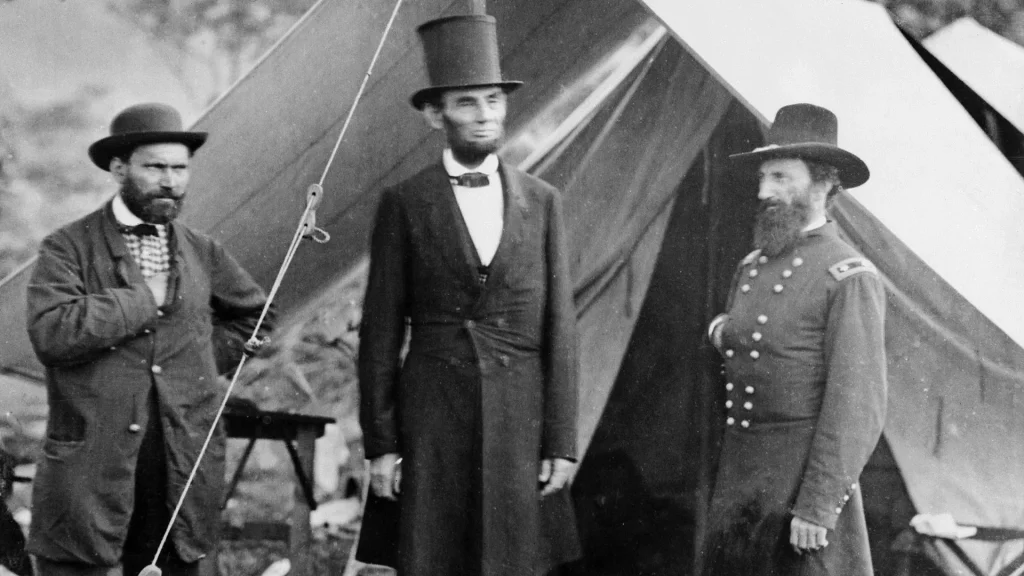Lincoln and the Civil War marked a defining moment in American history, revealing the complexities of leadership during one of the nation’s most tumultuous times. As the southern states seceded, tensions escalated, forcing Lincoln to navigate the delicate balance of preserving the Union while confronting the profound moral implications of slavery. His leadership style exemplified a gradual evolution in understanding the true stakes at hand, which culminated in the landmark Lincoln Emancipation Proclamation. Amid this backdrop, debates surrounding the Civil War causes highlighted varying historical interpretations of Lincoln’s motives and decisions. Events such as the Willard Peace Conference showcased Lincoln’s initial attempts at diplomacy, illustrating the profound struggle between his political strategy and the burgeoning conflict that would come to define a nation.
The narrative of Abraham Lincoln during the American Civil War encapsulates a struggle far beyond mere battlefield skirmishes; it dives into the heart of a nation grappling with the roots of division and how to uphold a fractured democracy. Many view this era, marked by the tensions between the North and South, as more than a battle; it serves as a testament to Lincoln’s evolving perspective on freedom and equality. His pursuit of harmony led to critical decisions, like the issuance of the Emancipation Proclamation, which aimed to redefine liberty in a fractured nation. The Willard Peace Conference stands as a poignant reminder of the attempts to forge compromise during this volatile period, while the underlying civil strife begs deeper inquiry into the varying interpretations of Lincoln’s leadership. Ultimately, this chapter in history continues to resonate, prompting ongoing discussions about governance, morality, and the quest for unity.
Understanding Lincoln’s Leadership in the Context of the Civil War
Abraham Lincoln’s leadership during the Civil War exemplifies a profound evolution in understanding and guiding a nation at a pivotal moment in history. Initially viewed as a moderate, Lincoln emerged as a strong advocate for the Union, confronting the complexities of slavery with a pragmatic approach. His famous quote, “A house divided against itself cannot stand,” epitomizes the moral conviction that ultimately shaped his presidency and the course of the Civil War. His leadership style was characterized by a blend of empathy and political acumen, allowing him to navigate the tumultuous waters of a divided nation while remaining resolute in his commitment to preserving the Union.
Moreover, Lincoln’s evolution as a leader was not merely reactive but also indicative of a profound internal struggle regarding the issues of freedom and equality. As the war progressed, Lincoln became more resolute in his stance against slavery, culminating in the issuance of the Emancipation Proclamation. This significant decision was not only a strategic move to weaken the Confederacy but also a moral imperative driven by a growing understanding of human rights. Thus, Lincoln’s leadership evolved into a clarion call for justice and equality, intertwining his personal revelations about governance with his responsibility to the nation.
The Causes of the Civil War and Lincoln’s Role
The causes of the Civil War are deeply rooted in the conflicting ideologies surrounding slavery and state rights. Leading up to the conflict, economic divisions between the industrial North and the agrarian South created a fertile ground for disagreement. Lincoln’s election in 1860 was perceived as a direct threat to the Southern way of life, as his party’s platform vehemently opposed the expansion of slavery into new territories. This divisive backdrop set the stage for secession and the eventual onset of war. Historians often interpret these events through varying lenses, reflecting on Lincoln’s attempts to reach common ground before the outbreak of hostilities.
Lincoln understood the gravity of the situation, actively engaging with Southern leaders in efforts to avert war. However, his steadfast commitment to halting the spread of slavery defined his political persona. Many contend that had Lincoln embraced a more conciliatory stance, a compromise might have been reached to avoid bloodshed. Unfortunately, the polarization was too profound, and the looming question of slavery’s place in America caught the nation in a relentless cycle of conflict, highlighting Lincoln’s pivotal role in navigating these turbulent waters.
Frequently Asked Questions
What was the impact of Lincoln’s leadership on the Civil War?
Lincoln’s leadership during the Civil War was pivotal in shaping the course of the conflict and the future of the United States. His dedication to preserving the Union and his moral opposition to slavery led to critical decisions, such as the issuance of the Emancipation Proclamation. This act not only freed enslaved people in Confederate-held territories but also redefined the war’s purpose to include the fight against slavery. Lincoln’s ability to unite diverse political factions and inspire the Northern public played a crucial role in maintaining support for the war effort.
What were the main causes of the Civil War related to Lincoln’s policies?
The primary causes of the Civil War related to Lincoln’s policies include the contentious issues of slavery and states’ rights. Lincoln’s election as a candidate opposed to the expansion of slavery heightened tensions between the North and South. His moderate stance aimed at containing slavery rather than outright abolition initially sought to appeal to border states, but the South perceived his election as a direct threat to their way of life. Additionally, Lincoln’s refusal to recognize the legality of secession was a significant factor in the outbreak of the war.
How did the Emancipation Proclamation change the Civil War’s objectives?
The Emancipation Proclamation, issued by Lincoln in 1863, transformed the Civil War from a battle for the Union into a fight for freedom. By declaring the freedom of all enslaved people in Confederate-held territories, Lincoln reframed the war’s purpose, garnering support from abolitionists and undermining the Confederate economy that relied on slave labor. This strategic move also allowed for the enlistment of Black soldiers into the Union Army, thereby strengthening the Northern efforts and adding a moral dimension to the conflict.
What are the historical interpretations of Lincoln’s leadership during the Civil War?
Historical interpretations of Lincoln’s leadership during the Civil War vary widely. Some view him as a heroic figure who navigated the nation through its most profound crisis with compassion and resolve, while others critique his methods and the moral implications of his decisions. Scholars often debate whether Lincoln was primarily motivated by a moral opposition to slavery or a pragmatic desire to preserve the Union. These differing interpretations underscore the complexity of his leadership and the ongoing discussions about the morality and necessity of war.
What was the significance of the Willard Peace Conference in the context of Lincoln and the Civil War?
The Willard Peace Conference, held in early 1861, was significant as it represented one of the last attempts at peaceful negotiation to avoid Civil War. Delegates from various states gathered to discuss potential compromises regarding slavery and secession. Although the conference ultimately failed to yield any solutions, it highlighted the deep divisions between the North and South. Lincoln’s involvement reflected his initial hope for a diplomatic resolution, but the failure of the conference foreshadowed the impending conflict and showcased the limits of compromise in an era steeped in passionate disagreements over slavery.
| Key Points |
|---|
| Lincoln’s Initial Approach to Ending Slavery |
| He was initially moderate and sought compromises with Southern states. |
| The Role of the Union as a Cause Worth Fighting For |
| Lincoln reframed the war’s purpose around the preservation of the Union. |
| Failed Peace Conference of 1861 |
| A conference aimed at preventing war exposed deep divisions without achieving compromise. |
| Lincoln’s Evolving Beliefs |
| His understanding of slavery evolved, seeing it as morally wrong. |
| Consequences of the Civil War |
| The war caused immense suffering, raising questions about its necessity and morality. |
| Historical Interpretation of Lincoln and the War |
| Modern scholars continue to debate Lincoln’s legacy and the war’s implications for democracy. |
Summary
Lincoln and the Civil War remain pivotal in American history, symbolizing not only the struggle against slavery but also the intricate dynamics of national unity. Lincoln’s attempt to preserve the Union was rooted in his evolving views on slavery, transitioning from a moderate approach to a moral imperative for emancipation. The Civil War, while marked by immense suffering and loss, is often viewed through a lens of inevitable conflict; however, it also poses critical questions about choice, compromise, and the cost of progress in American society. Understanding Lincoln’s journey during this time highlights the complexities of leadership and the haunting memory of a nation grappling with its values.



